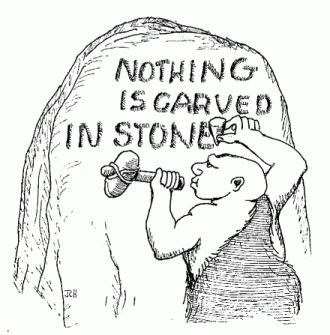 The fact is that Wittgenstein’s Tractatus Logico-Philosophicus created a functionary truth serum for philosophical realities; however, and through his own admission—nothing was attained or admissible for psychological realities: “What can be said at all can be said clearly, and what we cannot talk about we must pass over in silence.” (Cartoon credit: Thefirst philosopher. © 2002 by John Holden) The truth of this work and all psychological realities: “Silence speaks all the more eloquent than speech and all the more clear is silence in its speech—No longer need your silence slumber, eternally quiescent, but also may it infinitely reverberate.” This treatise is not meant to have the same type of logical coherence that traditional theoretical works, specifically in the physical sciences, seek to portray and purport to attain, which then lead to the formation of a set of mutually dependent principles that when taken in part or summation direct the individual theoretician to a singular and logical conclusion or system of thought. Instead this treatise is meant to illuminate the inconsistencies that belie the appearance of logical coherence itself, as only a verbal facsimile or word game. The reality is that with every conclusion or thought systemization there is a remainder or question mark. This is to say that in every conclusion there is a beginning and that in every system of thought there is something yet “un-thought” and that this is only shear folly to believe conclusively in anything or in a “completed” thought. To believe that everything has been said that can be said or shown all that there is to show. However, in direct alignment with the main thesis of this work which states that Wittgenstein’s silence is a self-imposed parameter of Logic and not of expression, there is also space for conclusion (this work does conclude—it does end) and for conclusive finalities—it is just the penchant for Logic or Rationality to deem itself the measure of sense and the punisher of irrationality and the nonsensical. There is a subterranean movement that produces its own offspring, wild and uncontrollable, vibrant and colored—that is not simply non-sense or dismissible as “mere” poetry. Logic has never and will never complete its own circuit because it bases its own foundation on a paradox and antinomy. These are the failures of deductive and inductive reasoning, which never themselves, nor threw any other currently known means, are capable of justifying the deducting premises nor induced conclusions. The internal antinomy of deductive logic is the completely baseless and assumptive nature of every deductive premise and likewise with induction and its non-extrapolating conclusions that are also only assumable potentials with no verifiable predictive capacity. And yet Logic, rationality and Reason have maintained a hegemonic deliverance or stranglehold for all knowledge allowed or disallowed. Not only the factual bits and historical minutia but also the ways knowledge is generated, from the scientific method to the Hegelian Dialectic, but also the way it is conveyed or transmitted, priestly classes and ivory towers. Logic is primarily and firstly about control. The explicit control it exerts is toward Thought as it gives the appearance of gentling guiding and ordering cognition but this same guidance and orderliness does not end with the harmless and beneficent cognitive processes. Logic’s control extends to and implicitly transmigrates to the socius, the economic and political, and is especially pernicious in regard to the lower classes or the segment of the populace whom are without the means of production, the rank and file producers—those without the means—an adequate educational system or the capability—the intellectual/cognitive ability to be educated, to wield the sword of Logic. Neither, Reason nor Logic, are to be specifically demonized or denigrated, but instead it is the motive of this work to highlight and critique the monopolizing power granted to these forms of information gathering and dispersing. It is neither this works aim to raise as cause célèbre and juxtapose the illogical or nonsensical with Logic, but it is to rather show that there is a very tangible alternative to the time honored celebration of Logic as the only and primary arbiter of experience and expression. The main purpose of this work is to realign the knowledge-power differential that has existed for centuries as Logic and Reason have been heavily weighted in favor of those who have had the means and capability to access and apply these very specific modes of relating. The relational dynamic that is created by Logic and Reason is twofold: One is to the entity that is Knowledge but also and more so there is the representational function of Knowledge, as channeled through Logic or Reason, as individual is meant to relate to individual and likewise socius to individual and individual to socius. A considerable degree, if not all relational dynamics are filtered through the cognitive lenses of “is it logical,” “are you being reasonable?” Again this is not to isolate, rehabilitate or champion the cause of nonsense or the illogical, but it is to show the merit and potential in their functions as effective foundational bases for Logic and Reason—as they themselves have never been able to ground themselves in themselves, which is itself, a bit of a paradox or antinomy.
2 Comments
|
UPTOWN THERAPY MPLSEdited and composed by Mathew Quaschnick
Sort articles by clicking below on ARCHIVES or CATEGORIES.
MENTAL HEALTH THERAPY
LOCATION AND HOURS:
1406 West Lake St. #204 Minneapolis, MN 55408
Monday - Friday: 9-5 PM with limited evening appointments
Archives
March 2017
Categories
All
|
|
Uptown Therapy is wonderful. I have benefited greatly these past 8 months and am sure to continue. |


 RSS Feed
RSS Feed
